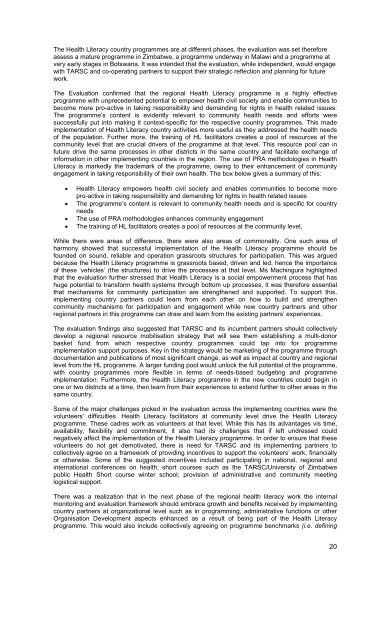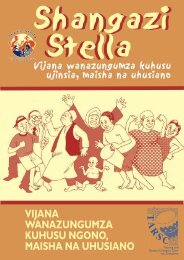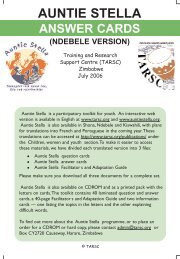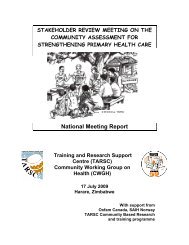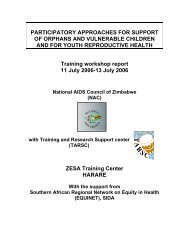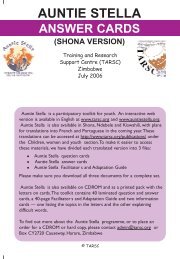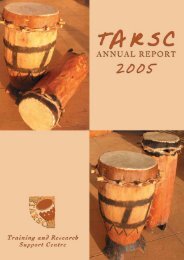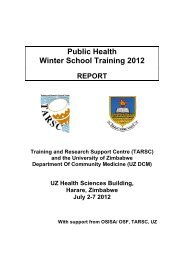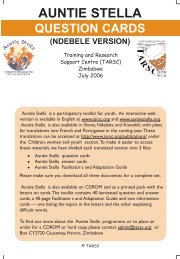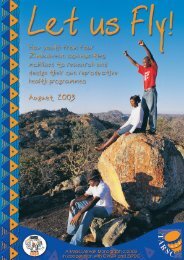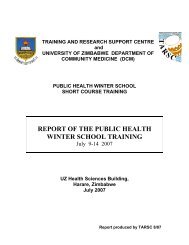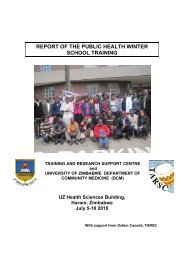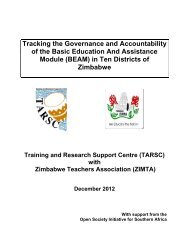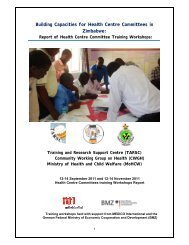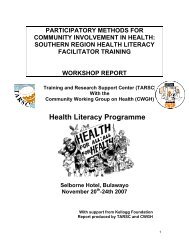HLregional meeting09.pdf - Training and Research Support Centre
HLregional meeting09.pdf - Training and Research Support Centre
HLregional meeting09.pdf - Training and Research Support Centre
Create successful ePaper yourself
Turn your PDF publications into a flip-book with our unique Google optimized e-Paper software.
The Health Literacy country programmes are at different phases, the evaluation was set therefore<br />
assess a mature programme in Zimbabwe, a programme underway in Malawi <strong>and</strong> a programme at<br />
very early stages in Botswana. It was intended that the evaluation, while independent, would engage<br />
with TARSC <strong>and</strong> co-operating partners to support their strategic reflection <strong>and</strong> planning for future<br />
work.<br />
The Evaluation confirmed that the regional Health Literacy programme is a highly effective<br />
programme with unprecedented potential to empower health civil society <strong>and</strong> enable communities to<br />
become more pro-active in taking responsibility <strong>and</strong> dem<strong>and</strong>ing for rights in health related issues.<br />
The programme’s content is evidently relevant to community health needs <strong>and</strong> efforts were<br />
successfully put into making it context-specific for the respective country programmes. This made<br />
implementation of Health Literacy country activities more useful as they addressed the health needs<br />
of the population. Further more, the training of HL facilitators creates a pool of resources at the<br />
community level that are crucial drivers of the programme at that level. This resource pool can in<br />
future drive the same processes in other districts in the same country <strong>and</strong> facilitate exchange of<br />
information in other implementing countries in the region. The use of PRA methodologies in Health<br />
Literacy is markedly the trademark of the programme, owing to their enhancement of community<br />
engagement in taking responsibility of their own health. The box below gives a summary of this:<br />
• Health Literacy empowers health civil society <strong>and</strong> enables communities to become more<br />
pro-active in taking responsibility <strong>and</strong> dem<strong>and</strong>ing for rights in health related issues<br />
• The programme’s content is relevant to community health needs <strong>and</strong> is specific for country<br />
needs<br />
• The use of PRA methodologies enhances community engagement<br />
• The training of HL facilitators creates a pool of resources at the community level,<br />
While there were areas of difference, there were also areas of commonality. One such area of<br />
harmony showed that successful implementation of the Health Literacy programme should be<br />
founded on sound, reliable <strong>and</strong> operation grassroots structures for participation. This was argued<br />
because the Health Literacy programme is grassroots based, driven <strong>and</strong> led, hence the importance<br />
of these ‘vehicles’ (the structures) to drive the processes at that level. Ms Machingura highlighted<br />
that the evaluation further stressed that Health Literacy is a social empowerment process that has<br />
huge potential to transform health systems through bottom up processes, it was therefore essential<br />
that mechanisms for community participation are strengthened <strong>and</strong> supported. To support this,<br />
implementing country partners could learn from each other on how to build <strong>and</strong> strengthen<br />
community mechanisms for participation <strong>and</strong> engagement while new country partners <strong>and</strong> other<br />
regional partners in this programme can draw <strong>and</strong> learn from the existing partners’ experiences.<br />
The evaluation findings also suggested that TARSC <strong>and</strong> its incumbent partners should collectively<br />
develop a regional resource mobilisation strategy that will see them establishing a multi-donor<br />
basket fund from which respective country programmes could tap into for programme<br />
implementation support purposes. Key in the strategy would be marketing of the programme through<br />
documentation <strong>and</strong> publications of most significant change, as well as impact at country <strong>and</strong> regional<br />
level from the HL programme. A larger funding pool would unlock the full potential of the programme,<br />
with country programmes more flexible in terms of needs-based budgeting <strong>and</strong> programme<br />
implementation. Furthermore, the Health Literacy programme in the new countries could begin in<br />
one or two districts at a time, then learn from their experiences to extend further to other areas in the<br />
same country.<br />
Some of the major challenges picked in the evaluation across the implementing countries were the<br />
volunteers’ difficulties. Health Literacy facilitators at community level drive the Health Literacy<br />
programme. These cadres work as volunteers at that level. While this has its advantages vis time,<br />
availability, flexibility <strong>and</strong> commitment, it also had its challenges that if left undressed could<br />
negatively affect the implementation of the Health Literacy programme. In order to ensure that these<br />
volunteers do not get demotivated, there is need for TARSC <strong>and</strong> its implementing partners to<br />
collectively agree on a framework of providing incentives to support the volunteers’ work, financially<br />
or otherwise. Some of the suggested incentives included participating in national, regional <strong>and</strong><br />
international conferences on health; short courses such as the TARSC/University of Zimbabwe<br />
public Health Short course winter school; provision of administrative <strong>and</strong> community meeting<br />
logistical support.<br />
There was a realization that in the next phase of the regional health literacy work the internal<br />
monitoring <strong>and</strong> evaluation framework should embrace growth <strong>and</strong> benefits received by implementing<br />
country partners at organizational level such as in programming, administrative functions or other<br />
Organisation Development aspects enhanced as a result of being part of the Health Literacy<br />
programme. This would also include collectively agreeing on programme benchmarks (i.e. defining<br />
20


